Munchausen Syndrome By Proxy: The Complete Guide


Munchausen syndrome, by proxy, is a mental illness and a form of child abuse.
The caretaker of a child, commonly the mother, makes up fake symptoms or causes symptoms so that their child appears sick.
The caretaker fakes or produces these symptoms to gain attention and have their children or dependents assume the “sick role.”
Munchausen by proxy is a serious condition, and it can be very hard to recognize in parents. Often, they seem very caring, loving, and involved in their children’s lives like any other parent. However, they intend to control and fabricate the situation for their sake.
Because it is hard to recognize, Munchausen, by proxy, often goes undiagnosed but can be extremely harmful and dangerous for the child.

Munchausen by proxy is now referred to as factitious disorder imposed on another or factitious disorder by proxy.
Yes, Munchausen, by proxy, is a mental illness, according to MedlinePlus.
Munchausen, by proxy, is a serious mental illness and form of abuse.
Caregivers with Munchausen by proxy can go to great lengths to get attention, even if it means risking their child’s life.
Munchausen by proxy is a serious crime, and children with parents with Munchausen by proxy should be taken out of their care and protected.
Symptoms of Munchausen syndrome can range from mild to severe.
Some people may exaggerate their symptoms, while others may self-impose harm and cause symptoms of illnesses that put their health and the health of others in danger.
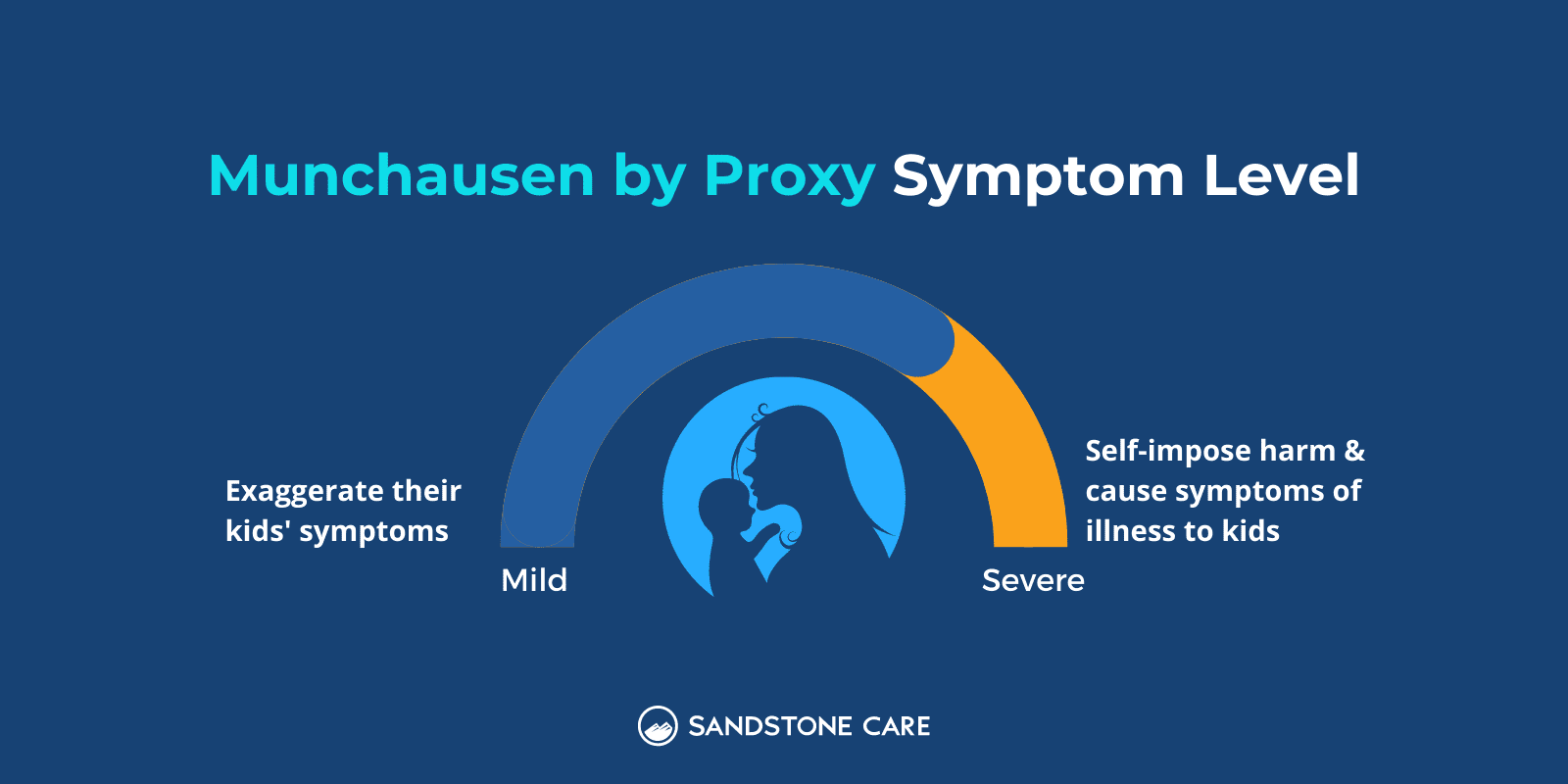
Munchausen, by proxy, involves physical abuse, neglect, and psychological abuse.
Children who have been victims of Munchausen by proxy abuse from their caregivers often have psychological damage that can last for a lifetime.
Munchausen, by proxy, can be extremely damaging to everyone involved.
A parent with Munchausen by proxy may psychologically or emotionally abuse their children by:
It is unknown why people develop Munchausen by proxy. However, some say that those with a history of abuse or who have Munchausen syndrome themselves are common factors in the development of Munchausen by proxy.

The root cause of Munchausen syndrome is unknown.
But, some theories find that a history of abuse or traumatic experiences is common in those with Munchausen syndrome.
The cause of Munchausen syndrome is not well known. However, research does not currently suggest that it is hereditary.
Most people with Munchausen by proxy are mothers with small children, often work in health care settings, and know a lot about medical care, according to Psychiatry.
However, Munchausen by proxy can also be found in fathers or other caregivers. It can even be seen in adult children who care for elderly parents.
It is unknown what causes or triggers Munchausen.
However, individuals diagnosed with Munchausen syndrome often have histories of trauma, abuse, or difficult life experiences.
Some theories suggest that the caregiver may have experienced:
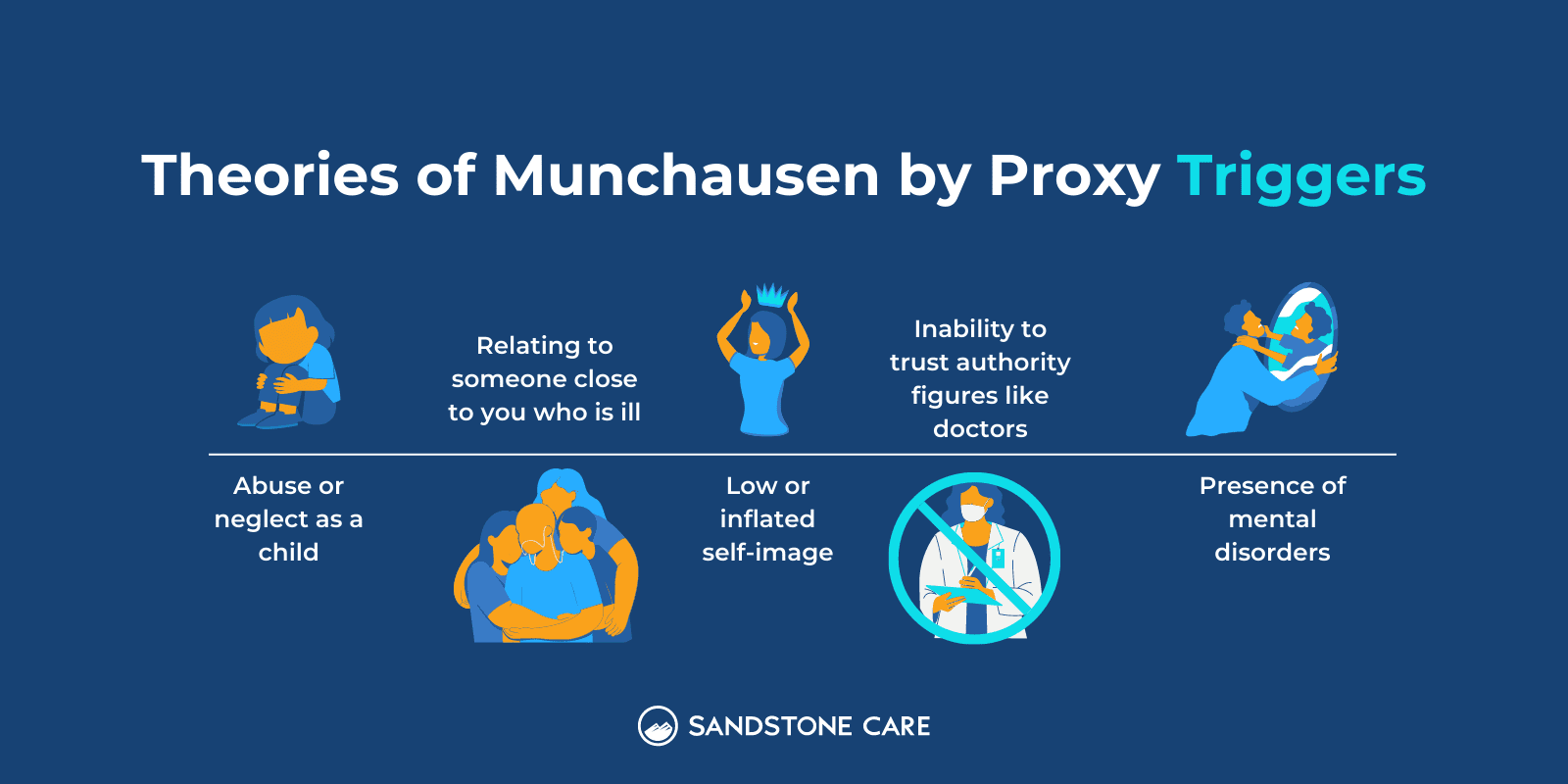
It can be hard to tell if someone has Munchausen by proxy because many of their behaviors seem well-intentioned.
They are often attentive and very involved, so it can be hard to see that something is wrong.
Common signs of Munchausen by proxy in a child can include:
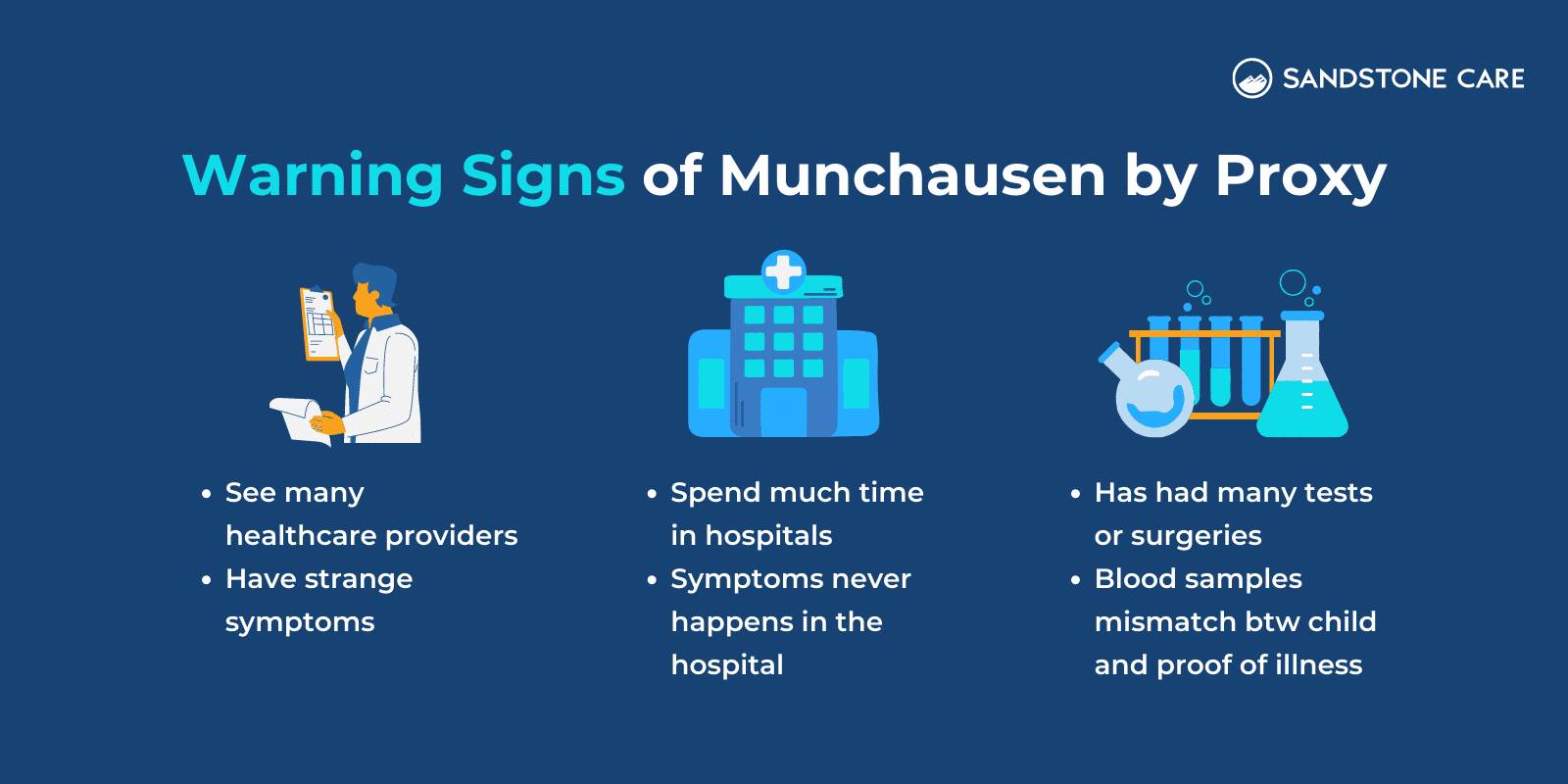
Signs of Munchausen by proxy in a caretaker can include:
It can also be hard to tell if a person has Munchausen’s because it can commonly be mistaken for or actually be medical illnesses, overanxious parenting, or actual psychiatric pathology.
It is important for medical professionals to gain awareness that pediatric symptoms can be intentionally falsified and to be able to recognize the warning signs of this relatively rare yet dangerous disorder.
People with Munchausen syndrome pretend and deliberately produce symptoms to make themselves look sick.
They often know they are not sick and have the goal of assuming the “sick role” for attention and to gain sympathy like what is given to those who are genuinely ill.
However, a person with Munchausen syndrome often does not believe they have a mental illness.
A person with Munchausen syndrome, by proxy, can do extreme things to fake illness in a child. This can involve:
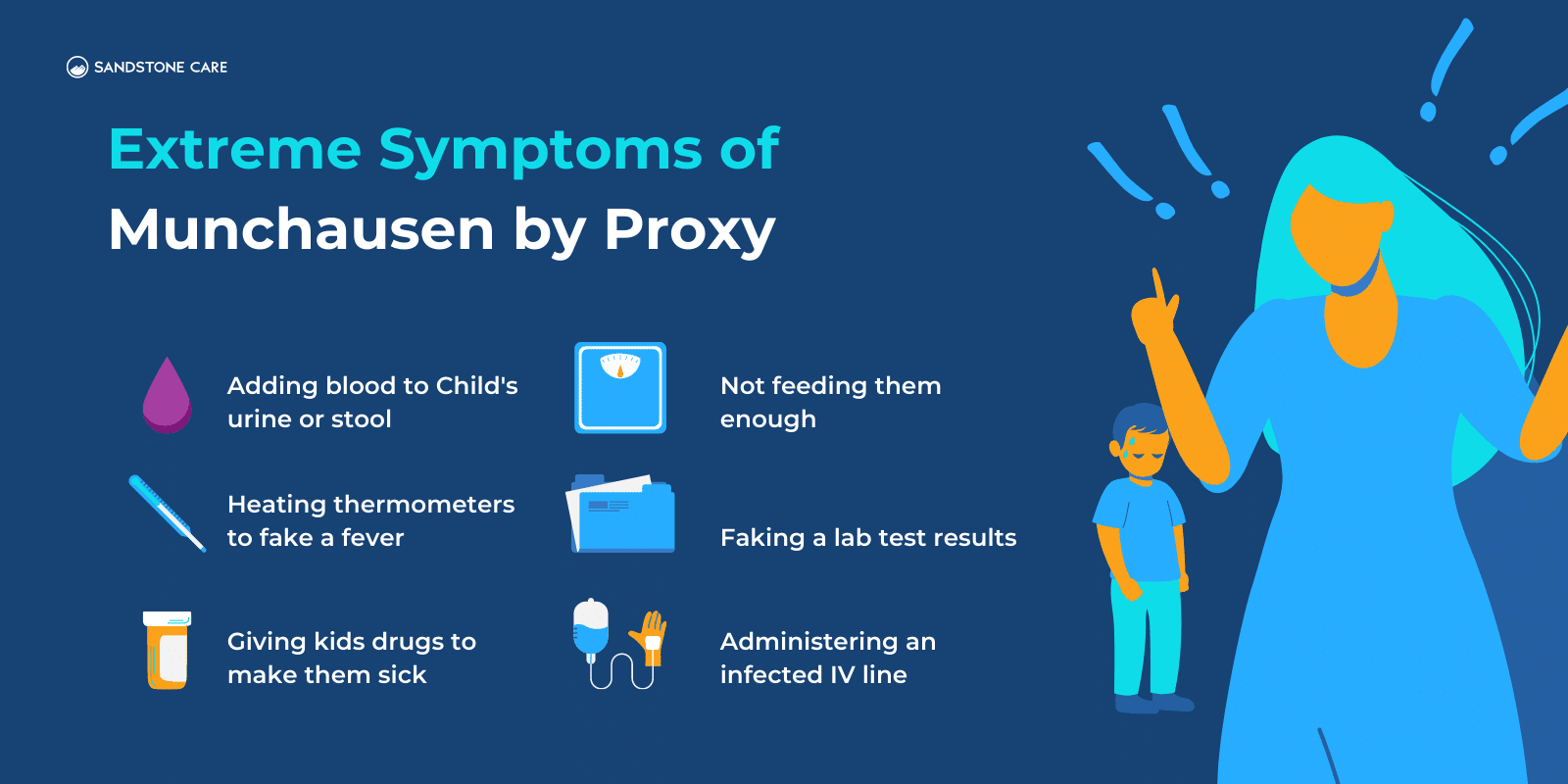
Parents with Munchausen syndrome, by proxy, lie and make up fake symptoms to make their children appear sick.
It can be hard to recognize the signs of a parent with Munchausen by proxy because they often seem loving, caring, attentive, and involved like any other parent.
Munchausen, by proxy, affects the caregiver but tremendously affects the dependent.
Munchausen, by proxy, can cause serious and sometimes life-threatening damage to a child. A child with a parent with Munchausen by proxy should be protected and put under care where they are safe.
Children with parents with Munchausen by proxy often face challenges long through their adult life from the physical and mental abuse they experienced.
Often, children that are victims of Munchausen by proxy abuse are small, young children.
A child with a caregiver with Munchausen syndrome by proxy is harmed mentally and physically.
Munchausen by proxy abuse often affects the child for their whole life, and in some cases, can become life-threatening.
Munchausen, by proxy, can cause health problems, including mental health disorders, malnutrition, infections, seizures, and much more.
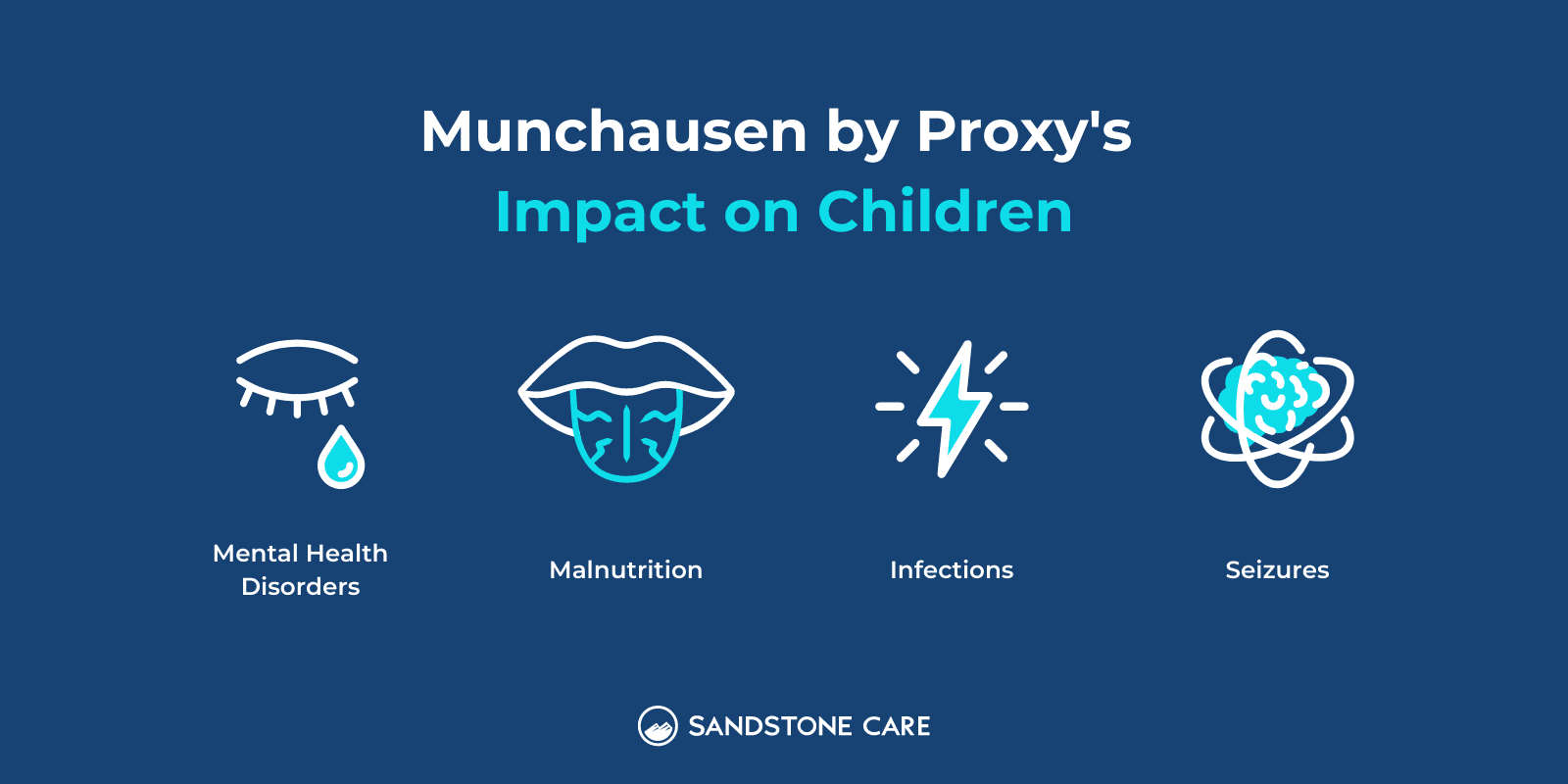
Munchausen syndrome can be very dangerous because it can cause a person to hurt themselves and inflict self-harm.
Individuals with mild Munchausen syndrome may exaggerate symptoms and talk about it, whereas people with severe cases may physically produce symptoms.
They may injure themselves to get attention or gain sympathy.
People with Munchausen’s may present symptoms that include:
To achieve these symptoms, a person may suffocate, make themselves vomit, use laxatives or other drugs, swallow or inject hazardous substances, scratch or injure their skin, poke themselves with a sharp instrument, or disconnect IV lines.
People with Munchausen often know they are lying or making up false symptoms, yet many do not believe they have a mental illness.
Yes, the American Psychiatric Association’s Diagnostic and Statistical Manual of Mental Disorders (DSM-5) recognizes factitious disorder by proxy, also known as Munchausen by proxy.
The DSM-IV-TR requires that three criteria be met for a diagnosis of factitious disorder:
The DSM-IV recognizes the types of factitious disorder to be:
Munchausen’s disorder can also be confused with malingering, which is the falsification or exaggeration of illness to gain external benefits like avoiding work, seeking drugs, avoiding the law, or getting paid leave from a job.
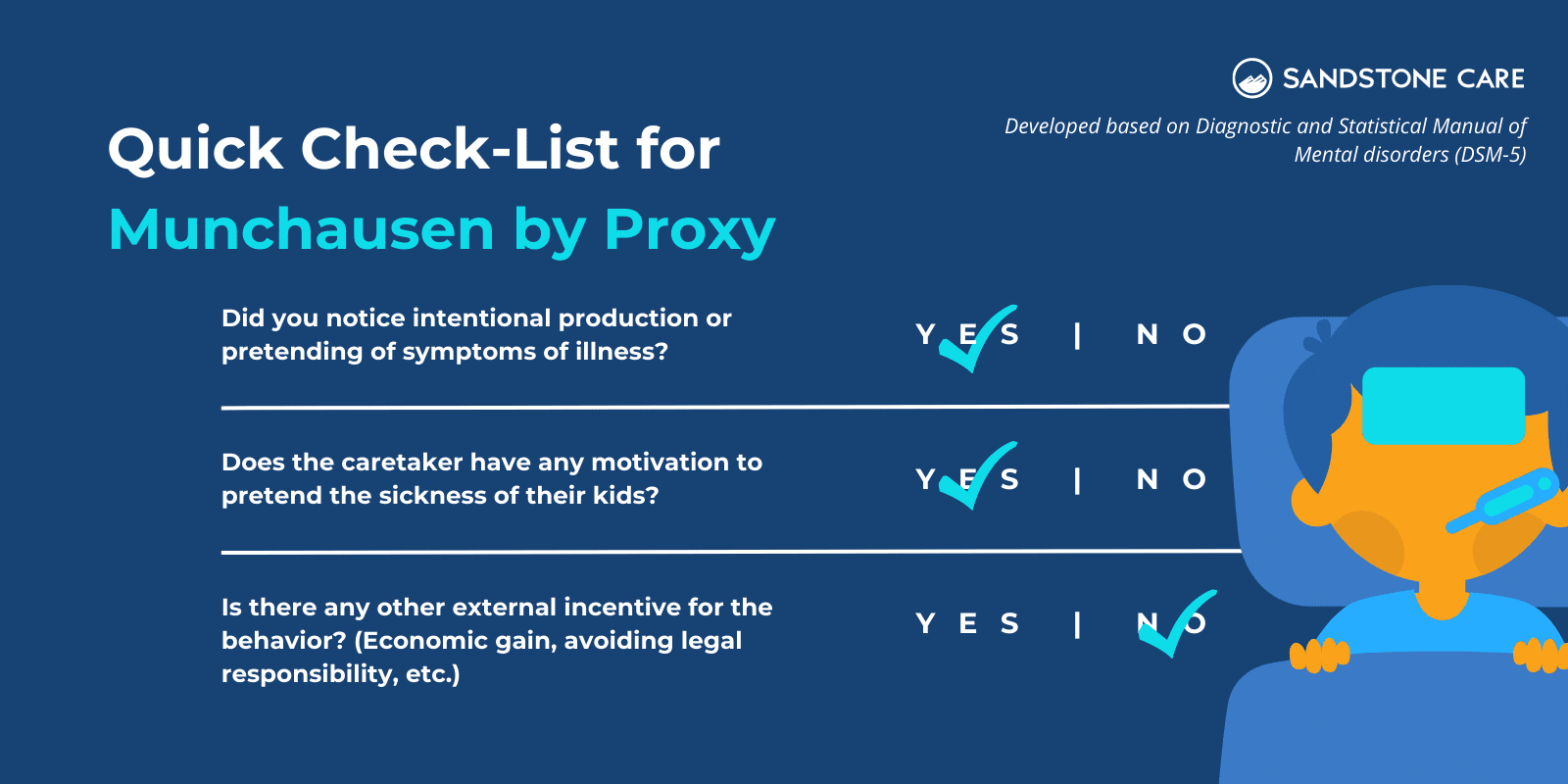
Munchausen, by proxy, is a very complex mental illness to understand.
Research is still being done to understand the psychology behind Munchausen by proxy and what drives a person to fake symptoms in their children.
Often, the person wants special attention and sympathy, but it is hard to understand why.
If you suspect someone has Munchausen syndrome by proxy, it is important to contact and notify a healthcare professional, the police, or child protective services (CPS).
If you believe a child or anyone is in danger, call 911.
To diagnose Munchausen syndrome by proxy, providers have to see the subtle signs and review the patient’s medical history.
Often, Munchausen syndrome goes undiagnosed.
Certain factors that may prove someone has Munchausen syndrome can include:
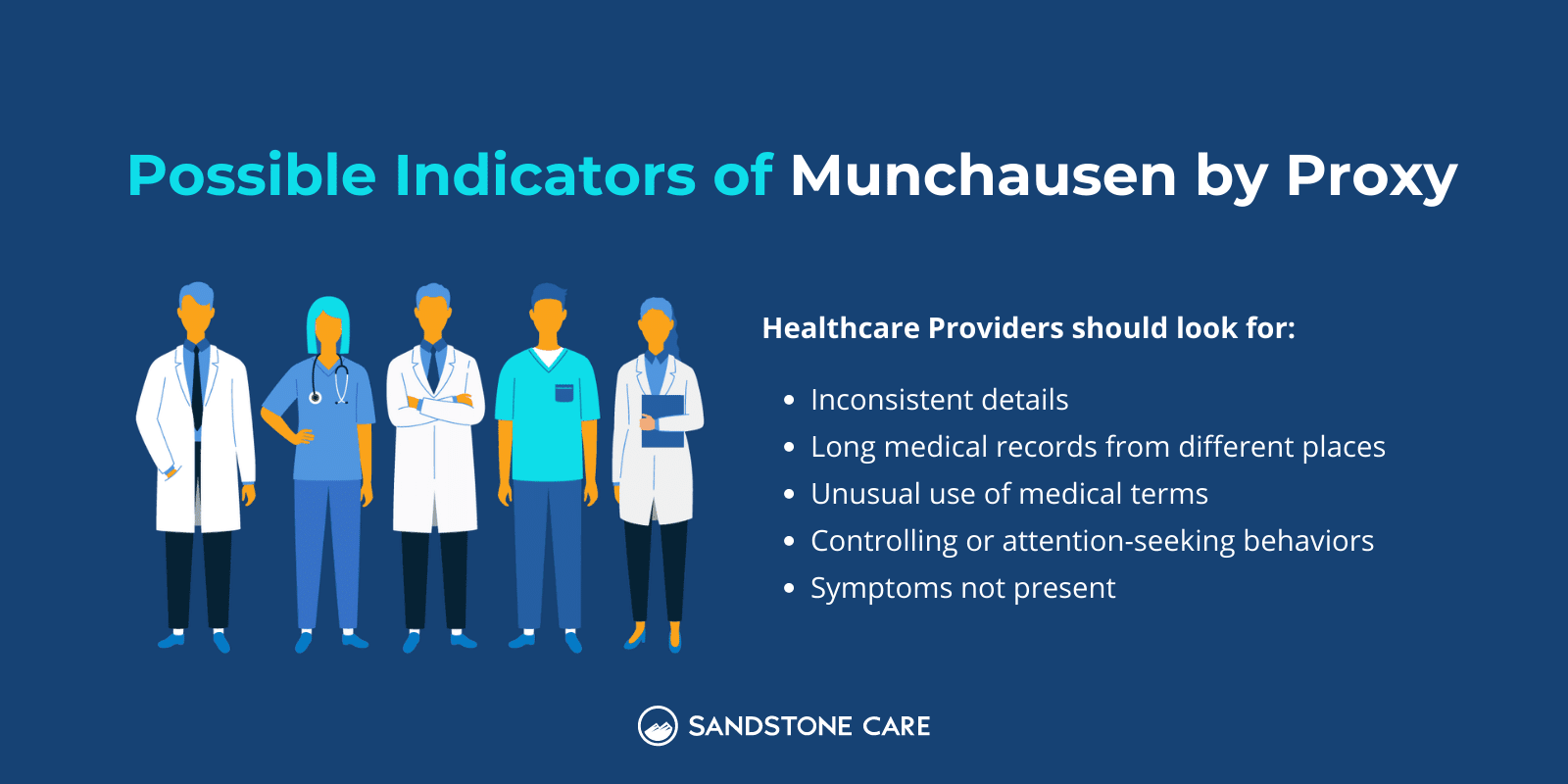
It can be very hard to prove Munchausen by proxy.
Caregivers with Munchausen by proxy often seem very involved, caring, and worried about their children, just like any other parent. This can make it hard for medical professionals and others to even recognize the warning signs of Munchausen by proxy.
It can also be very difficult because some illnesses are inexplicable, so there has to be enough proof that the parent is pretending and abusing their child.
Authorities will often have to look far back into the person’s medical history and see if there is enough evidence to support that it is Munchausen by proxy and not something else, like overprotective parenting or a real medical illness.
There is no known cure for Munchausen by proxy.
Treatment for Munchausen by proxy often involves individual and family therapy.
A person may learn to manage the symptoms of Munchausen by proxy through psychotherapy.
For a child of a caregiver with Munchausen by proxy, they may need medical care for physical harm they experienced. They also need psychiatric care for conditions that come as a result of their experiences and abuse, including anxiety, depression, and post-traumatic stress disorder.
While this can be a complicated illness to treat, psychotherapy can help people understand how their thoughts, feelings, and actions are connected and learn how to restructure them into healthy behaviors.
If you suspect someone has Munchausen, notify a healthcare professional, police, or child protective services.
If you believe that someone is in imminent danger, call 911.
Victims of Munchausen, by proxy, often face lifelong physical and emotional problems.
Children may need medical care for any medical problems they experienced or developed as a result of Munchausen by proxy syndrome, whether it be complications from injuries, medicines, infections, or surgeries.
They also often face significant psychological problems and need care for mental health conditions like depression, anxiety, and post-traumatic stress disorder (PTSD).
According to Child Abuse & Neglect, victims of Munchausen by proxy abuse have reported both physical and emotional damage, insecurity, reality-testing issues, avoidance of medical treatment, and symptoms of PTSD.
FAQ
Our goal is to provide the most helpful information. Please reach out to us if you have any additional questions. We are here to help in any way we can.
A commonly known case of Munchausen by proxy is Dee Dee Blanchard and her Gypsy-Rose Blanchard.
In this case, Dee Dee Blanchard kept her daughter, Gypsy, in a wheelchair her whole life and claimed she had ailments like muscular dystrophy and leukemia.
Munchausen syndrome is when a person fakes they have an illness, and Munchausen by proxy is when a caregiver, often the parent, pretends their dependent has an illness.
Factitious disorder imposed on self was formerly known as Munchausen syndrome.
The two terms may be used interchangeably.
Mothers with Munchausen syndrome by proxy often work in the healthcare field.
Because of this, they have a lot of medical knowledge and background, so they know what symptoms match specific illnesses and how hospitals work.
Munchausen, by proxy, is a form of child abuse and a crime.
If a child has a parent or caregiver with Munchausen by proxy, they need to be protected right away. They should be removed from the care of the caregiver in question by authorities.
Munchausen syndrome by proxy allegations is very serious. If a caregiver is charged, they may lose custody of their child and face imprisonment.
Munchausen, by proxy, refers to a form of child abuse and mental illness where a caregiver fakes or causes harm to their dependent.
This illness is most commonly seen in mothers with young children, but it can also affect men, older children, and elderly people who are being taken care of by their adult children.
Three movies or TV shows that portray Munchausen syndrome can include:


Munchausen syndrome by proxy is an extremely dangerous mental illness and form of child abuse. Sandstone Care is here to support teens and young adults with mental health and substance use disorders.